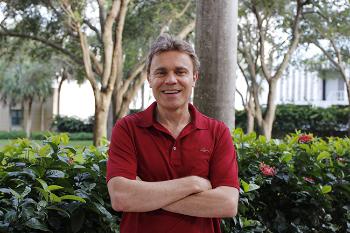Neil Johnson, a professor in the Physics Department at the University of Miami College of Arts and Sciences known for applying physics to collective behavior, has been recognized for his outstanding contributions to physics with his election as a 2017 Fellow of the American Physical Society (APS) by the APS Council of Representatives.
According to the nomination letter, Johnson is being honored for “significant advancements in the area of physics and society both in the public domain and among policymakers, involving the application and implementation of new physics on the topic of complex systems and networks.”
 |
The APS also awarded Johnson its Joseph A. Burton Forum Award, which the society bestows on scholars for their outstanding contributions to the public understanding or resolution of issues involving the interface of physics and society. Johnson will receive a $3,000 monetary award when society members formally present him with the Forum Award, which recognizes the many scientific contributions of Joseph Burton, APS’ treasurer from 1970 to 1985.
Johnson credited both the award and fellowship to UM's vision for fostering problem-based interdisciplinary research by its faculty, both within the College of Arts and Sciences and beyond. “I am so pleased that the international physics community is now embracing a broader scope for physics that will help attract more students and increase the wider relevance of the subject,” he said.
Johnson’s expertise focuses on the physics of collective behavior and emergent properties in complex real-world systems—from the physical, biological, medical, social and financial domains. In addition to his core physics research in the area of smart materials, energy harvesting and cyber-physical systems, Johnson has recently analyzed the role women play in extreme networks, such as terrorist groups, and how infinitesimal delays in electronic stock exchange data can affect networks that operate quicker than the blink of an eye.
He currently leads an interdisciplinary research group studying the collective behavior of physical, biological, medical, social, and financial systems.
October 25, 2017

